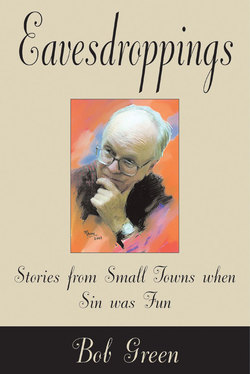Читать книгу Eavesdroppings - Bob Green - Страница 27
На сайте Литреса книга снята с продажи.
Оглавление19 Professor Thiele
Professor Thiele was the first charismatic person I ever saw. I was with my parents on Water Street trying to see a parade through the legs of a crowd.
Parades in the 1930s were one of the few forms of entertainment people could afford, mainly because they cost nothing. Several bands had gone by, huffing and puffing, and all I saw were flashes of braid and brass. Then someone said, “Here comes Professor Thiele,” and the whole crowd rose on tiptoe. His band, the Waterloo Music Society Band, exceptionally precise and powerful, towered above every band that had passed.
I managed to pop my head out from under a fat lady’s arm and — pow! There he was, Professor Thiele, the legend, baton in hand, his white uniform gleaming, marching before a wall of trombones. That the band was dressed in dark blue made him gleam in white all the more.
John Mellor, in his biography of Thiele, Music in the Park, says the professor and his family, before they immigrated to Canada, were virtually an institution in the United States. Thiele had played with John Philip Sousa and Edwin Goldman and had toured with his own family concert troupe. His wife, Louise, was a cornet virtuoso; was accomplished on the piano, marimbaphone, and clarinet; and was a spellbinder with her dramatic readings. Dramatic readings in those days were the mark of a superior band concert.
So how on earth did they get to Waterloo?
When the United States entered the war against Germany in l917, anti-German hysteria left Thiele and his family unemployed, even though both he and his wife had been born in America. Broke and desperate, Thiele answered an advertisement in the magazine Billboard for a bandmaster in a place called Waterloo, Ontario, Canada, and came up for an interview. As he boarded a train in New York City, he told his wife to buy a French dictionary in case he got the job. “Everybody up there speaks French,” he said. A week later, when he returned jubilant with the job, he said, “Throw out that French dictionary, Louise. Believe it or not, up there they all speak German.”
So they moved to Waterloo and turned it into the brass band Mecca of North America. The professor organized tattoos that attracted as many as seventy bands and 50,000 spectators to Waterloo Park at a time when the town’s population was pushing 5,000. He founded Waterloo Music Company, which manufactured band instruments, many of which he gave to bandsmen who couldn’t afford them. Thiele gave free music lessons, too, hence the title “Professor.” He also bought land on which he built a summer camp for fledgling musicians, calling it Bandburg. Later Thiele was acclaimed as the father of Canadian brass band music.
Thirty years and countless accomplishments later, the Professor was awarded a day in his honour and paraded in an open convertible behind his band to Waterloo Park where thousands gathered to cheer. The driver of the convertible, Charlie Schneider, a close friend of Thiele’s, told me about the event many years later.
“The Professor,” Charlie said, “was sitting on top of the rear seat, waving to the crowd as we followed the band into Waterloo Park. When the band began to countermarch on the grass, I swung the car around them and headed towards the throng lining the field. I drove under some spruce trees without a thought as to how high the Professor was sitting. The crowd suddenly went quiet. I turned to see what the Professor might be doing and … he wasn’t there. A spruce bough had swept him off. Right away a voice beside me hollered, ‘Charlie, let me in!’ It was the Professor, running beside the car. He was holding his hat in his hand. The back of his jacket was covered with grass stains. I stopped and opened the door, and in no time he was back on top of the rear seat, waving. The crowd went crazy. He always surprised them.”
